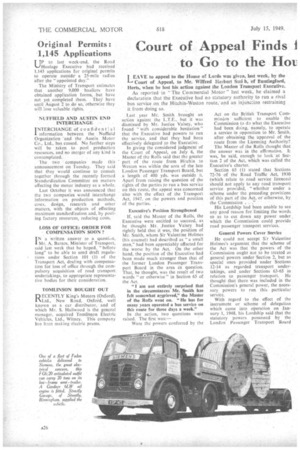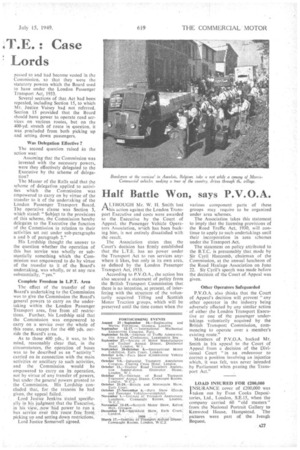Court of Appeal Finds 1 .T.E. Case to Go to the Hot Lords
Page 4

Page 5

If you've noticed an error in this article please click here to report it so we can fix it.
LEAVE to appeal to the House of Lords was given, last week, by the Court of Appeal, to Mr. Wilfred Hetbert Smi h, of Euntingford, Hens, when he lost his action against the London Transport Executive.
As reported in The Commercial Motor" last week, he claimed a declaration that the Executive had no statutory authority to run a rival bus service on the Hitchin-Weston route,-and an injunction restraining it from doing so.
Last year Mr. Smith brought an action against the L.T.E., but it was dismissed by Mr. Justice Vaisey, who found with considerable hesitation" that the Executive had powers to run the service, and that' they had been effectively delegated to the Executive.
In giving the considered judgment of the Court of Appeal, on July 6, the Master of the Rolls said that the greater part of the route from Hiitchin to Weston was within the area of the late London Passenger Transport Board, but a length of 400 yds. was outside it. Apart from raising the question of the rights of the parties to run a bus service, on this route, the appeal was concerned also with the effect of the Transport Act, 1947, on the powers and position of the parties.
Executive's Position Strengthened
If, said the Master of the Rolls, the Executive were entitled to succeed, as he thought Mr. .Justice Vaisey had rightly held that it was, the position of Mr. Smith, whom Sir Valentine Holmes (his counsel) had described as "a small man," had been appreciably affected for the worse by the Act. On the other hand, the position of the Executive had been made much stronger than that of the former London Passenger Transport Board in the area in question. That, he thought, was the result of two words "or otherwise" in Section 65 of the Act.
"I am not entirely surprised that in the circumstances Mr. Smith has felt somewhat aggrieved," the Master of the Rolls went on. "He has for many years operated a bus service on this route for three days a week."
In the action, two questions were raised. The first was:—
Were the powers conferred by the Act on the British Transport Commission sufficient to enable the Commission to do what the Executive had been doing, namely, to operate a service in opposition to Mr. Smith, after obtaining the approval of the route from the Licensing Authority? The Master of the Rolls thought that the answer was in the affirmative. It was he said, enough to look at Sec lion 2 of the Act, which was called the Executive's charter.
Sectiem 65 (1) stated that Sections 72-76 of the Road Traffic Act, 1930 (which relate to road service licences) should not apply to any road transport service provided, "whether under a scheme under the preceding provisions of this part of the Act, or' otherwise, by the Commission . . ."
His Lordship had been unable to see any good reason for limiting the words so as to cut down any power under, which the Commission could provide road passenger transport services.
General Powers Cover Service
He could not accept Sir Valentine Holmes's argument that the scheme of the Act was that the powers of the Commission ought not to be treated as general powers under Section 2, but as special ones provided under Sections 12-14 as regarded transport 'undertakings, and under Sections 63-65 in relation to passenger transport. He thought that there was included in the Commission's general power, the necessary powers to run this particular service.
With regard to the effect of the instrument or scheme of delegation which came into operation on January 1, 1948, his Lordship said that the statutory powers possessed by the London Passenger Transport Board
passed to and had become vested in the Commission, so that they were the statutory powers which the Board used to have under the London Passetrger Transport Act, 1933.
Several sections of that Act had been repealed, including Section 15, to which Mr. Justice Vaisty had not referred. Section 15 provided that the Board should have power to operate road services on various routes, but on the 400-yd. stretch of route in question, it was precluded from both picking up and setting down passengers.
Was Delegation Effective ?
The second question raised in the action was: Assuming that the Commission was invested with the necessary powers, were they effectively delegated .to the Executive by the scheme of delegation?
The Master of the Rolls said that the scheme of delegation applied to activities which the Commission was empowered to carry on by virtue of the transfer In it of the undertaking of the London Passenger Transport Board. The operative clause was Section 3, which stated: "Subject to the provisions of this scheme, the Commission hereby delegates to the Executive the function of the Commission in relation to their activities set out under sub-paragraphs a and 5 of paragraph 2."
His Lordship thought the answer to the question whether the operation of this bus service was wholly or substantially something which the Commission was empowered to do by virtue of the transfer to it of the Board's undertaking, was wholly, or at any rate substantially, "yes."
Complete Freedom in L.P.T. Area
The effect of the transfer of the Board's undertaking to the Commission was to give the Commission the Board's general powers to carry on the undertaking within the London Passenger Transport area, free from all restrictions. Further, his Lordship said that the Commission was empowered to carry on a service over the whole of this route, except for the 400 yds. outside the Board's area,
As to those 400 . yds., it was, to his mind, reasonably clear that, in the circumstances, the operation of buses was to be describedas an " activity " carried on in connectiOn with the main activities or ancillary to such activities, and the Commission -would be empowered. to carry on its operation, not by virtue of any transfer of powers, but under the general powers granted to the Commission. His Lordship concluded that, for. the reason-is lie had
given, the appeal failed...
-Lord Justice Jenkins staled .specifically in his j4dgMent that the Executive,. in his view now had power to run a bus service Over this route free: from picking up and setting down restrictions.
Lord Justice SomervelI agreed.


























